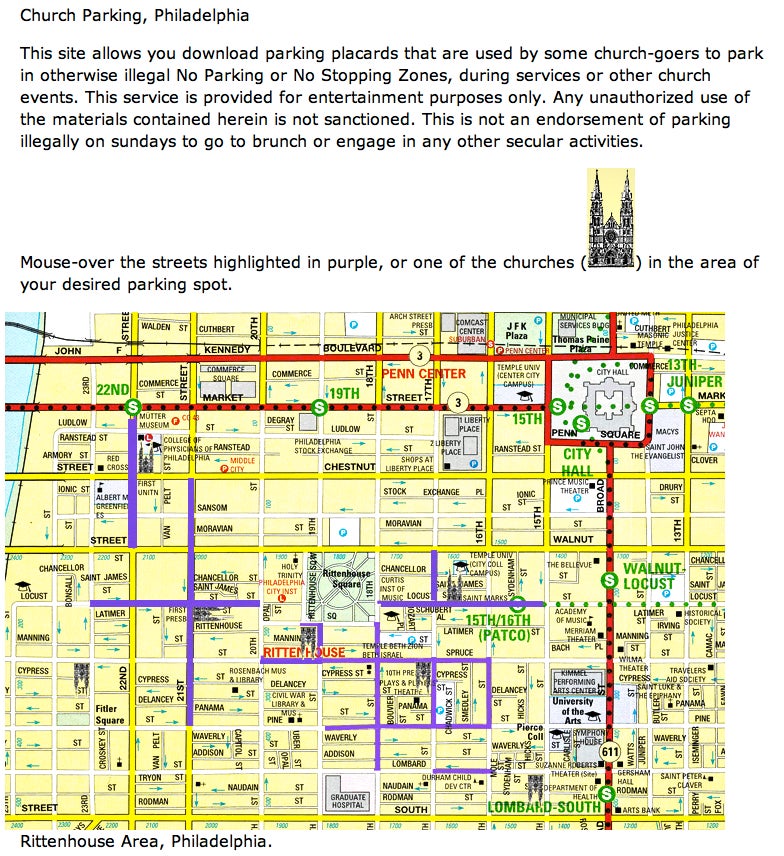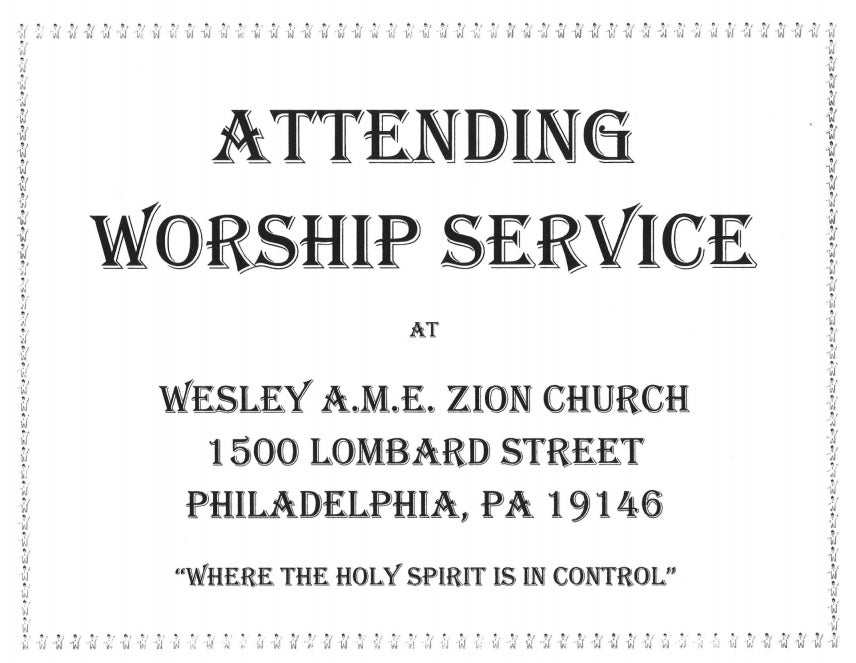When you don’t have to pray for parking
Philadelphia has a long-standing tradition of relaxing parking rules to give Sunday morning worshippers an easier time finding a spot on crowded Center City streets.
Congregants can put special placards on their dashboard to avoid getting tickets for parking in otherwise illegal no parking or no stopping zones.
Now, non-believers can get in on the pass-to-pray – or play – action, too.
The site churchparkingforatheists.com has uploaded PDFs of parking placards for seven houses of worship around Rittenhouse Square, ranging from the First Unitarian Church on Chestnut Street to the north and Wesley A.M.E. Zion Baptist Church on Lombard Street to the south.
Several of the churches listed, including the Tenth Presbyterian Church on Delancey, have permission to park in the coveted Spruce and Pine bike lanes, which are otherwise closed to traffic.
Though the site says it’s for “entertainment purposes only” and “not an endorsement of parking illegally on sundays [sic] to go to brunch or engage in any other secular activities,” site founder Nick Gruberg said he’s done exactly that with counterfeit placards.
Gruberg, who now lives in San Diego, said he was inspired to start the site when trying to find parking to go to brunch at Parc, the swanky bistro overlooking Rittenhouse Square.
“Of course it is not about going to brunch, it is about the fact that people are getting preferential treatment for their religious observance,” he wrote in an e-mail ― though he admitted that he occasionally used fake placards to secure a parking spot.
Gruberg’s site certainly makes it easy for others to do the same.
The homepage has a helpful map that clearly displays the areas each of the seven places of worship have been given by the city to park.
And each individual congregation gets its own webpage, which helpfully details the paper type a given placard should be printed on.
The Ethical Humanist Society of Philadelphia hands out pink placards, for instance. The site even provides a sample and its specific place on the RGB color chart.
The homepage also asks readers to send in PDFs of placards of more churches, so they can be added to the list.
Representatives of houses of worship on the site seemed nonplussed by the whole thing.
An official at the First Presbyterian Church on South 21st Street, who declined to give her name, said she wasn’t aware of the site and isn’t aware of anyone gaming the system by using pirated placards.
She did say, however, that worshippers who come in from other neighborhoods “definitely take advantage of the parking.”
They pick up legitimate parking placards from church deacons during Sunday services, she explained.
The Rev. D. Marion Clark of the Tenth Presbyterian Church said he was aware of the site but wasn’t aware of anyone misusing the placards.
He added that the congregation takes up all the spaces alloted to it every Sunday.
The Rev. Nathan C. Walker of the First Unitarian Church was more philosophical about the whole thing.
He said that few members in his congregation drive in for services ― the majority walk, bike or take SEPTA ― and that the site didn’t get permission to put a copy of his church’s placard online.
Walker also questioned the satire seemingly underlying the site.
“I’m not really sure what it means because we have many atheists in our congregation,” he said, adding that “any of the atheists in our community are doing things in a religious organization.”
(And to be fair to members of Rittenhouse Square’s ethical humanist community, it’s worth noting they belong to a society, not a church, and that members can also be atheists.)
Gruberg, for his part, doesn’t draw that fine a distinction, writing that both groups “are given special treatment because they are religious organizations, regardless of whether their congregants believe in god.”
While the site’s been around since 2009 ― and isn’t updated all that much anymore now that Gruberg is a graduate student at the University of California, San Diego ― it has gained a new following since being featured on Philebrity and Reddit.
He reports the site got 7,612 visitors last month and that 5,779 placards were downloaded. Though he doubts many of those will be ultimately used he’s “got this idea that the more [placards] that are out there the more meaningless they become.”
But Corinne O’Connor, director of on-street parking for the Parking Authority, said Parking Authority workers avoid issuing parking tickets in a two-block radius around places of worship from 9 a.m. to 2 p.m. on Sundays ― that way, congregants don’t get ticketed for forgetting to display their placards.
O’Connor, who hadn’t heard of the site, said she planned on having enforcement agents see if there’s been an increase in people utilizing church parking recently or using forged placards.
Contact the reporter at acampisi@planphilly.com
Philadelphia has a long-standing tradition of relaxing parking rules to give Sunday morning worshippers an easier time finding a spot on crowded Center City streets.
Congregants can put special placards on their dashboard to avoid getting tickets for parking in otherwise illegal no parking or no stopping zones.
Now, non-believers can get in on the pass-to-pray – or play – action, too.
The site churchparkingforatheists.com has uploaded PDFs of parking placards for seven houses of worship around Rittenhouse Square, ranging from the First Unitarian Church on Chestnut Street to the north and Wesley A.M.E. Zion Baptist Church on Lombard Street to the south.
Several of the churches listed, including the Tenth Presbyterian Church on Delancey, have permission to park in the coveted Spruce and Pine bike lanes, which are otherwise closed to traffic.
Though the site says it’s for “entertainment purposes only” and “not an endorsement of parking illegally on sundays [sic] to go to brunch or engage in any other secular activities,” site founder Nick Gruberg said he’s done exactly that with counterfeit placards.
Gruberg, who now lives in San Diego, said he was inspired to start the site when trying to find parking to go to brunch at Parc, the swanky bistro overlooking Rittenhouse Square.
“Of course it is not about going to brunch, it is about the fact that people are getting preferential treatment for their religious observance,” he wrote in an e-mail ― though he admitted that he occasionally used fake placards to secure a parking spot.
Gruberg’s site certainly makes it easy for others to do the same.
The homepage has a helpful map that clearly displays the areas each of the seven places of worship have been given by the city to park.
And each individual congregation gets its own webpage, which helpfully details the paper type a given placard should be printed on.
The Ethical Humanist Society of Philadelphia hands out pink placards, for instance. The site even provides a sample and its specific place on the RGB color chart.
The homepage also asks readers to send in PDFs of placards of more churches, so they can be added to the list.
Representatives of houses of worship on the site seemed nonplussed by the whole thing.
An official at the First Presbyterian Church on South 21st Street, who declined to give her name, said she wasn’t aware of the site and isn’t aware of anyone gaming the system by using pirated placards.
She did say, however, that worshippers who come in from other neighborhoods “definitely take advantage of the parking.”
They pick up legitimate parking placards from church deacons during Sunday services, she explained.
The Rev. D. Marion Clark of the Tenth Presbyterian Church said he was aware of the site but wasn’t aware of anyone misusing the placards.
He added that the congregation takes up all the spaces alloted to it every Sunday.
The Rev. Nathan C. Walker of the First Unitarian Church was more philosophical about the whole thing.
He said that few members in his congregation drive in for services ― the majority walk, bike or take SEPTA ― and that the site didn’t get permission to put a copy of his church’s placard online.
Walker also questioned the satire seemingly underlying the site.
“I’m not really sure what it means because we have many atheists in our congregation,” he said, adding that “any of the atheists in our community are doing things in a religious organization.”
(And to be fair to members of Rittenhouse Square’s ethical humanist community, it’s worth noting they belong to a society, not a church, and that members can also be atheists.)
Gruberg, for his part, doesn’t draw that fine a distinction, writing that both groups “are given special treatment because they are religious organizations, regardless of whether their congregants believe in god.”
While the site’s been around since 2009 ― and isn’t updated all that much anymore now that Gruberg is a graduate student at the University of California, San Diego ― it has gained a new following since being featured on Philebrity and Reddit.
He reports the site got 7,612 visitors last month and that 5,779 placards were downloaded. Though he doubts many of those will be ultimately used he’s “got this idea that the more [placards] that are out there the more meaningless they become.”
But Corinne O’Connor, director of on-street parking for the Parking Authority, said Parking Authority workers avoid issuing parking tickets in a two-block radius around places of worship from 9 a.m. to 2 p.m. on Sundays ― that way, congregants don’t get ticketed for forgetting to display their placards.
O’Connor, who hadn’t heard of the site, said she planned on having enforcement agents see if there’s been an increase in people utilizing church parking recently or using forged placards.
Contact the reporter at acampisi@planphilly.com
WHYY is your source for fact-based, in-depth journalism and information. As a nonprofit organization, we rely on financial support from readers like you. Please give today.





